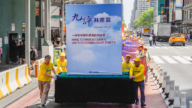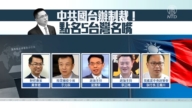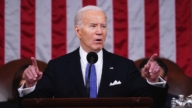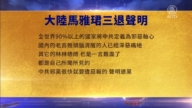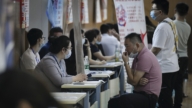【新唐人2012年11月22日訊】媒體報導,在溫家寶卸任中共總理之後,新的領導層可能會為實現2020年所要達到的能源目標,而大幅增加新的水電工程項目。水電真如官方所說,是清潔能源嗎?這種能源開發方式是否適合中國?請看報導。
中共政府計劃在2020年以前把中國的發電能力提高50%,同時削減煤炭消耗,並減少對進口天然氣的依賴。「英國廣播公司(BBC)」說,面臨這樣嚴峻的能源供應挑戰,中共新高層除了推動水電工程之外別無選擇,因爲煤炭發電和核能更難贏得公眾支持。
溫家寶在任期內曾經親自阻止一些水電工程的上馬,以避免當地民眾抗議,BBC引用「中國水力發電工程學會」副秘書長張博庭的話說,溫家寶當政期間擱置了許多水電工程項目,2006年至2010年間認定的優先項目中只有三分之一切實施工。
不過官方早已有計劃,要在這個十年內對開發水電「下重手」。國家能源局局長張國寶2010年8月就對大陸媒體說,為了達到2020年,非化石能源在一次能源中的比例佔15%的目標,其中水電至少要承擔9%。
《路透社》援引「廈門大學中國能源經濟研究中心」主任林伯強的話說,並不是說水力發電是最好的選擇,但這是唯一的選擇。
然而,就水電開發問題長久以來官方和民間一直持有兩種論調。官方宣傳,水電是清潔可再生能源,而且開發技術相對成熟。但學者和環保人士則認爲,水電工程伴隨大量人口遷移,水土流失,環境破壞等問題,如果考慮生態環境成本,社會成本,和保養整修等,水電是中國最昂貴的能源形式。
四川地礦局教授級的總工程師、水利專家範曉指出,關鍵在於:中國目前水電開發的模式是「沒有選擇的」。
水利專家範曉:「所謂沒有選擇,就是它叫『全江全流域的梯級開發』,就是他把整個這個自然河流全部變成水庫。也就是他要把這個水力發電的資源利用到最大,但是他沒有考慮其他方面的問題。因爲水資源是一個綜合性的資源,它不僅僅是用來發電的,所以不能把整個河流全部都變成一個梯級水庫群。從可持續發展、綜合協調來看,肯定是有問題的。」
以中國最典型的水電工程「三峽大壩」來看,當大壩蓄水達到設計的最終蓄水位175米時,26臺發電機組將全部投入運行,估計每年發電847億度。「三峽大壩」從2008年開始試驗性蓄水,到2010年才實現175米的蓄水目標。
範曉「它現在這個發電法是矛盾的。要發電它一定要把水位蓄到175,最近這兩年它是蓄到175了,但是這是以下游的乾旱,包括洞庭湖,和鄱陽湖,包括長江中下游的水位,它持續性的,只要是在這個蓄水的時間,都會出現水位急劇的下降,它是以這個為代價的。」
在「三峽水壩」達到蓄水設計的兩年,中國最大的淡水湖「鄱陽湖」都在5月出現乾涸,第二大淡水湖「洞庭湖」的水位屢創歷史最低。兩大湖湖心變草原,水產養殖損失嚴重,漁民生計困難。
大陸民主人士郭永豐:「在中國這樣一個體制,這樣一個大環境限制下,資源的糟蹋,尤其是環境的污染特別嚴重。只看眼前不顧長遠,養成了一個惡性的循環,是一個環境的災難。」
北京戰略信息分析公司——「安邦集團(ANBOUND GROUP)」的分析人員之前指出,中國的生態環境,並不允許中國在水電開發上直追歐美國家的比例。另有統計顯示,中國大陸爲數衆多的水庫存在著極其嚴重的安全問題,一旦潰壩將造成嚴重的生命財產損失,和環境破壞。
採訪/李蓮 編輯/尚燕 後製/葛雷
Hydropower Plans Embarrass CCP’ New Leadership
Recent reports claim that after Wen Jiabao steps down,
the new Chinese Communist Party (CCP) leaders may develop hydropower projects to realize the 2020 energy goal.
Although the CCP insists that hydropower is sustainable,
is this really the case?
Is the current way of energy development
appropriate for China?
According to its 2020’energy goal, the CCP plans
to increase the power generation capacity by 50%.
This will be in conjunction with reducing coal consumption
and lowering the current dependence on imported natural gas.
A BBC report remarked that challenged by such a serious
situation in power supply,
the new CCP leadership has no choice but push forward
the development of hydropower.
Building new plants of coal power or nuclear power
can be even harder to win support from the public.
During Wen Jiabao’s term in office,
he had blocked several hydropower projects.
BBC cited words from Zhang Boting, vice secretary general
of China Society for Hydropower Engineering (CSHE).
Zhang commented that Wen suspended hydropower projects
in the past few years to prevent protests from local residents.
Between 2006 and 2010, only one third of the high priority
projects started actual construction.
However, the CCP had long ago planned to “extensively"
develop hydropower over the next ten years.
Former executive of National Energy Administration
Zhang Guobao spoke with mainland media in August, 2010.
He stated that non-fossil energy is projected to reach 15%
of the total primary energy in 2020,
and the fraction of hydropower should be no less
than 9% at that time.
Reuters’report cited words from Lin Boqiang, chief of China
Center for Energy Economics Research, Xiamen University.
Lin explained that hydropower is not the best choice
for China, but it is the only choice available.
There have been two different opinions on the development
of hydropower -.official and environmental.
The CCP government claims that hydropower is a kind of
sustainable power with mature technology for development.
On the other hand, many scholars and environmentalists
argue that hydropower projects usually lead to soil and water loss, environmental destruction and other problems.
With those ecological, social and maintenance costs
of power stations taken into account, hydropower can be the most expensive power in China.
Chief Engineer of Sichuan Bureau of Geology and mineral
resources, Fan Xiao spoke on the issue.
He believes that the key point is, the CCP’s current model
of hydropower development is “indistinguishable."
Fan Xiao (Hydropower Expert): “The so-called
‘indistinguishable" model refers to the cascaded development over ‘all basins of all rivers.’
The government tries to convert natural rivers into reservoirs
to maximize the available resource of hydropower.
However, such a development model ignored other problems
because the water resource is ‘multifunctional’ and should not be only used to generate power.
You can’t make all the rivers
become simply cascaded reservoirs.
From the view of sustainable development and broader
coordination, there must be something wrong behind that."
Let’s take the most well-known hydropower project
in China, the Three Gorges Dam (TGD), as an example.
The design maximum water level is 175 meters which will
drive all the 26 units of generators at work and provide power-generation capacity of 84.7 TWh per year.
The Three Gorges Dam started to raise it’s water level
in 2008, reaching 175 meters in 2010.
Fan Xiao:"The current model of its power generation
is very problematic.
To generate power it has to keep raising
it’s water level to 175 meters.
Although this was accomplished over the past two years,
it has resulted in droughts of downstream regions, including in the Dongting Lake and the Poyang Lake.
Water levels of all middle and lower reaches of Chang Jiang
continuously drop when the TGD tries to hold the water.
That is the cost of its power generation."
In the past two years when the Three Gorges Dam reached
its designed water level, China’s largest freshwater lake, the Poyang Lake suffered drought problem in May.
China’s second largest freshwater lake,
the Dongting Lake’s water level also hit its historic low.
The central region of these two lakes even became grasslands,
which has caused great loss in aquatic products and greater difficulties in the livelihood of local fishermen.
Guo Yongfeng (Mainland democrat): “Under the CCP’
controlled situation, the waste of resources, especially the pollution problem has become extremely serious.
The vicious cycle of making polices regardless of long-term
benefits has led to disasters of environmental destruction."
Anbound Group analysts, a Beijing-based company of
strategic information analysis, explained that ecologically China cannot develop hydropower like Western countries.
In addition, other statistics revealed
serious safety problems in many of China’s reservoirs.
Once a dam breaks, it will lead to unimaginable loss of lives,
properties, and serious destruction of the environment.




